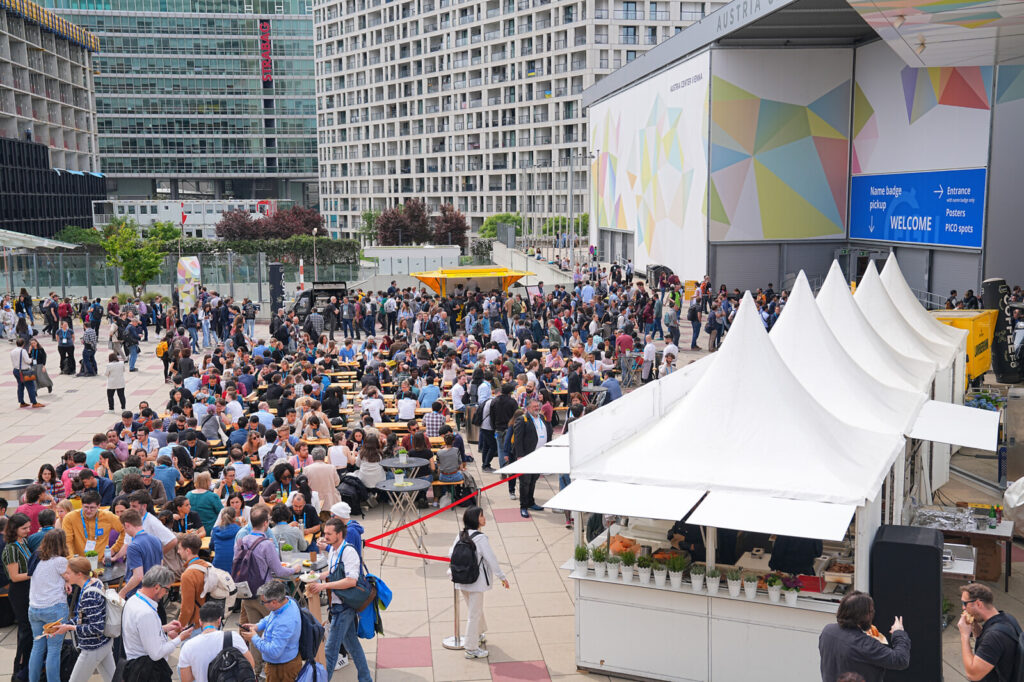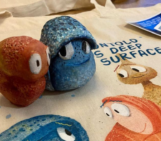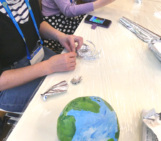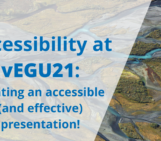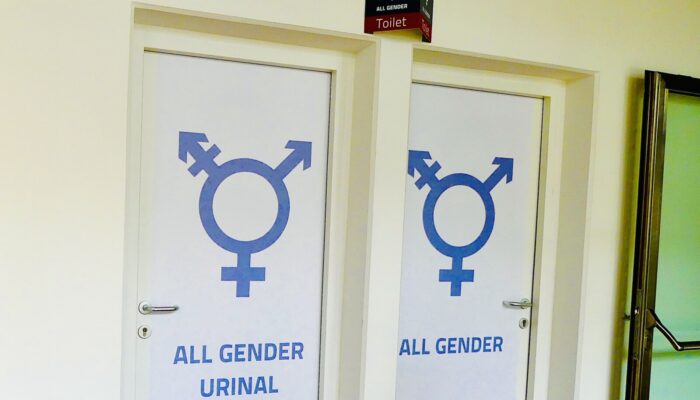
The annual EGU General Assembly is a wonderful chance to gather together with friends and colleagues to discuss recent scientific work, plan new projects and develop your career, but a scientific meeting, especially one the size and length of time of the General Assembly is not an equally accessible experience for everyone. With this in mind over the years EGU have developed a range of resources aimed at increasing the accessibility of the meeting to a more diverse group of people, but if you are unsure what those resources are, we have gathered many of them in this blog to help you find them, whether you are a person attending with children, with a disability, with specific religious requirements, travel challenges or any other reason, to help you have the best meeting possible!
There is a lot to get through, so let’s jump right in!
Attending EGU25 with children
If you are one of the many people who attends the General Assembly with children, balancing time for science with childcare can be a real challenge. To help you as much as possible with this EGU have several resources on offer whether your child is a newborn or a teenager. Firstly for anyone attending on-site who is presenting don’t miss out on booking a free childcare slot with our professional on-site childcare service. This is a very popular service, available for children aged 1-12 years old covering Monday to Friday, 08:30–12:30 and 14:00–18:00, and to make a booking you must have a paid registration. Check out the EGU25 childcare page for more information. In addition to this service if you are travelling with a child under 3 years old you can request a waiver for an additional parent or support carer who is not participating in the meeting to assist you with childcare responsibilities.
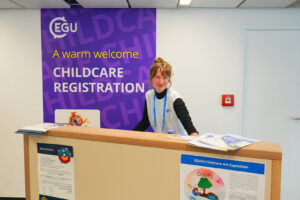 In the conference center itself, in addition to the staffed childcare facilities we also have two family rooms on the purple level (-2) with comfortable chairs and tables, books, toys and a microwave for preparing food, as well as private breastfeeding spaces if you prefer to use those. We also provide free colouring books on-site (with a geoscience theme of course!) but if you want to print off your own colouring pages you can access the pdfs for free here.
In the conference center itself, in addition to the staffed childcare facilities we also have two family rooms on the purple level (-2) with comfortable chairs and tables, books, toys and a microwave for preparing food, as well as private breastfeeding spaces if you prefer to use those. We also provide free colouring books on-site (with a geoscience theme of course!) but if you want to print off your own colouring pages you can access the pdfs for free here.
Public transport in Vienna is fairly straightforward and for all registered attendees you can use your travel pass included with your EGU25 registration to use all city public transport for free, from Monday to Friday. Children under 6 years old travel for free on public transport, and for all other children a weekly pass is easy to book in advance.
Child-friendly activities in Vienna are easy to find, in good weather the nearby Donaupark offers playgrounds and a quiet place to relax with the children whilst they run off some steam. The Vienna city tourist board all offers a range of guidance for people travelling with children.
If you need to change your plans at the last minute to care for a sick child, whether to stay in your hotel room, or even to cancel your travel altogether, your on-site registration covers both on-site AND virtual access for the whole week of the meeting, so you can still connect, listen in to presentations and ask questions of the presenters wherever you are. If something arises and you can no longer make in on-site to present your abstract, you can email egu25@copernicus.org to enquire about switching to virtual participation (last minute changes are more easily accommodated for some presentation formats than others) or assign a colleague who will be on-site as the abstract’s presenting author.
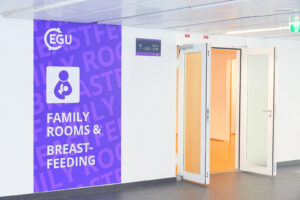 Attending the meeting online when you are also responsible for childcare presents it’s own set of challenges, and this year was the first year a fund was made available for people who needed financial support to help arrange childcare wherever you are. If you missed that opportunity, the only thing we can offer is the knowledge that on several occasions in the past few years people have presented their work with their children on screen too (whether they were supposed to be there or not!) and our meeting attendees were always encouraging and accommodating of the challenges of parenting whilst also being a scientist!
Attending the meeting online when you are also responsible for childcare presents it’s own set of challenges, and this year was the first year a fund was made available for people who needed financial support to help arrange childcare wherever you are. If you missed that opportunity, the only thing we can offer is the knowledge that on several occasions in the past few years people have presented their work with their children on screen too (whether they were supposed to be there or not!) and our meeting attendees were always encouraging and accommodating of the challenges of parenting whilst also being a scientist!
If you are looking for extra help and guidance from other people who have had their children with them during the General Assembly, check out the EGUblogs for more info here, here and here.
Attending EGU25 with a disability
Anyone who has a disability of any kind knows that large conferences present a whole host of barriers to participation. The meeting is loud, busy, often crowded and especially overwhelming if you are balancing your own health and wellbeing with the traditional ways that these meetings are run. In order to attempt to mitigate these challenges both EGU and the conference center, the Austria Center Vienna, are making changes every year to reduce barriers to participation, and make the meeting space more flexible. These measures currently include:
- The entire conference center has step-free access options available, in cases where this is reliant on accessibility lifts, staff are on hand throughout the meeting to provide instant access to these – whether to get participants into a meeting room or onto stage to present. For additional support, contact the EGU info desk on the Yellow Level, call +49 176 21444874, or you can email egu25@copernicus.org in advance to facilitate any accessibility arrangements you may require.
- Hand-held and hands-free microphones are available to speakers in PICO and oral presentations, and to all audiences.
- Flexible height and angle presentation screens and lecterns, and seating options are available to presenters of all formats (including posters and PICO presentations).
- Conference assistants are available to help with putting up and taking down posters in all poster halls.
- Closed captions are provided for all Union-wide events and short courses. We also encourage people to use captioning in their own presentations and to think about accessible language.
- The route to the conference center from the nearest public transport is step free, and made of asphalt and concrete. There is wheelchair accessible parking at the Austria Center Vienna that has a single continuous ramp to the venue.
- We are a facemask friendly meeting, and no-one is required to remove a facemask in order to present, network, receive awards or medals, or participate in any other EGU activity.
For full details of the building’s accessibility features, you can read this document provided by the Austria Center Vienna.
If you are attending the meeting with a support person or carer, then these people are entitled to a registration fee waiver. Their registration can only be acquired by email. To secure the waiver, send the full name and email address of the support person together with the invoice number of the registered attendee to egu25@copernicus.org. A special registration link will then be sent to the support person allowing them to register for free.
To make interaction easier EGU are offering a range of alternative lanyards that you can choose to use if you prefer, that indicate your need to be offered a seat, a need for people to talk more slowly with you, or indicating that you have a hidden disability. No disclosure is required for you to have one of these lanyards, you just have to go to the EGU booth in the Exhibition Hall (purple level) and exchange your regular EGU lanyard for the lanyard of your choice All new EGU lanyards (including the new designs) will also be adjustable, so you can set them to a comfortable length for you to wear and for others to read.
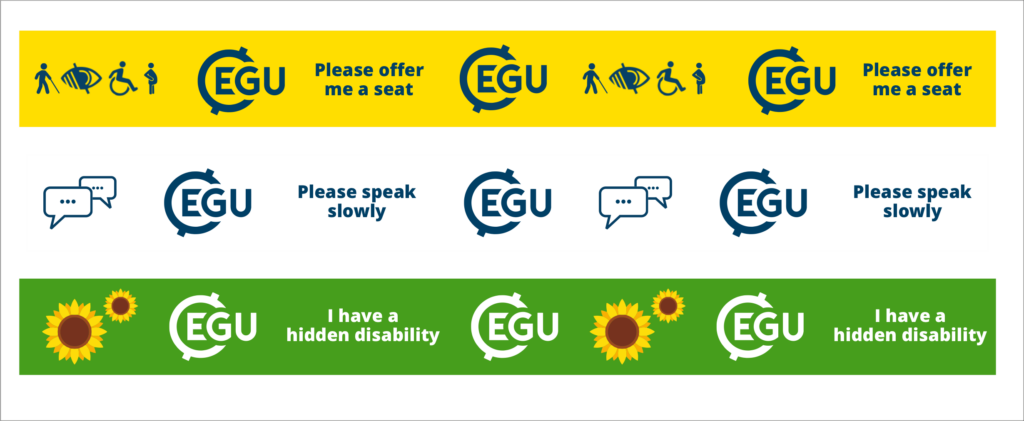
For when you are participating in the meeting on-site there are dedicated quiet rooms on the purple level (-2) where you can take a moment of calm away from the busyness of the meeting. There are also outdoors spaces which can be valuable for getting quiet time away from the crowds, the terraces on the purple level (-2) and the blue level (3). The schedule of the meeting is set up in such a way that activities are set in specific times, and although we know you are likely to be busy you should be able to plan your day without feeling too overwhelmed. The personal programme and the EGU25 app help you to organise this (both will be available soon). Also each presentation format is organised into 10 minute blocks, so you should be able to accurately time the presentations you need/want to attend without sitting in the whole session if you are not able to, but we don’t recommend trying to attend too many different sessions in one time block as that can be a very stressful experience and the conference center is very large.
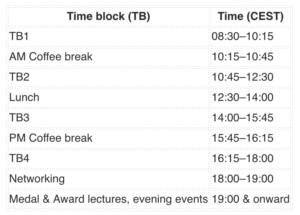 Every floor of the meeting is accessible by elevators and there is an on-site doctor on the yellow level in room 0.41 (beside the entrance to the Panoramic Walk, the Union wide session room E1 and the Exhibition), available for free to help anyone who needs assistance or support.
Every floor of the meeting is accessible by elevators and there is an on-site doctor on the yellow level in room 0.41 (beside the entrance to the Panoramic Walk, the Union wide session room E1 and the Exhibition), available for free to help anyone who needs assistance or support.
Beyond the physical constraints of attending the meeting are the mental, emotional and sensory impacts. EGU’s Early Career Scientists are very focused on helping all EGU participants to prioritise their own wellness, and started a series of blog posts called ‘Mind your head‘ with advice on everything from impostor syndrome to healthy advisor-advisee relationships that are an excellent resource. In this instance the nearby Donaupark is very valuable again, providing you with a green outdoor space for decompression and to allow you to recenter yourself. If you are joining online, why not take advantage of our digital EGU25 Quiet Room playlist, and follow our advice on taking breaks whilst attending a virtual meeting.
Another way to manage your capacity can be choosing when to attend a session on-site, or virtually. All on-site registration covers both on-site AND virtual access for the whole week of the meeting, so you can still connect, listen in to presentations and ask questions of the presenters wherever you are. If something arises and you can no longer make in on-site to present your abstract, you can email egu25@copernicus.org to enquire about switching to virtual participation (last minute changes are more easily accommodated for some presentation formats than others) or assign a colleague who will be on-site as the abstract’s presenting author.
For some other first hand descriptions of attending the General Assembly with a disability, read the following blog posts here and here.
Food and drink at the EGU General Assembly
There are a range of food and drink options at the General Assembly, both inside and nearby the meeting, but given that we expect around 19,000 people to be attending the meeting onsite expect these provisions to be busy. There is food provided at outlets by the Austria Center Vienna’s caterer Motto on the purple (-2), yellow (0) and red (2) levels (look for the cutlery symbol on the floor plans). This food is freshly prepared on-site with full information about allergens or additional information available upon request. Motto also have a number of additional coffee outlets that provide a more limited menu of snacks and cakes.
Outside the main venue there is a ‘Beergarten’ area with a number of food trucks providing a range of food options, with outdoor seating. Starting this year the vendors will be able to take pre-bookings for food requests, reducing the amount of time required for queuing during peak times. Keep an eye on the EGU25 website for updates on how to book and reserve your food.
About a 5-10 minute walk from the entrance to the conference center are some grocery stores where you can also purchase foodstuffs or drinks. The three closest are the bakery Ströck, which is open from 06:30-18:00, the supermarket Billa, open 07:30-19:45 and the supermarket Höfer (on the lower level of the concourse around the ACV), open 07:30-19:30. Bear in mind that as the Thursday (1 May) is a public holiday all shops are likely to be closed this day.
Within the conference center there are many free water stations, so don’t forget to bring your reusuable water bottle, and each day free tea and coffee is provided during the morning and afternoon breaks, but the queue for these can be fairly long (pro-tip, head to the coffee points in the Exhibition and poster halls, they can often have shorter queues)! On the floor plans, the water stations are marked by rain drops, and the coffee stations by coffee cups.
Other resources for meeting attendees
- Free online participation for people from certain geographical locations, and those who are undergraduate or masters level students!
- Guide to inclusive language – it can be easy to slip into using gendered language, especially when English is not your native language, but this guide should help you catch some of the more frequently used words.
- Avoid using rainbow scales! They are actually very hard to read for a lot of people and create more of a barrier to understanding.
- If you are someone who doesn’t have English as your native language and are worried about discussing your work in a busy and loud environment, pick up one of our new ‘Please speak slowly’ lanyards, to help people adjust to a more easily understood speaking speed.
- Emergency menstrual products are available for free at the Information Desk, Press Center and at the Facility Desk of each poster hall (Hall X1, Hall X2, Hall X3, Hall X4, Hall X5, and Hall A).
- Half our bathrooms are ‘All Gender’ bathrooms, although some of those do still have urinals in them (due to the building’s construction). All Gender bathrooms are available on each floor.
- Multi-faith prayer rooms are available on the purple level (-2) for use at any time during the conference opening hours. Please be respectful of other users of these spaces.
- Discrimination of any other person on the basis of dress/appearance, religion, perceived or stated gender identity, career stage, age, marital status, sexual orientation, racialised identity, disability or any other marginalised identity is strictly prohibited and against EGU’s Code of Conduct, which all attendees agreed to upon registration. If you experience or observe a violation of this Code of Conduct, and you feel able to, you can report this to EGU’s Persons of Trust for appropriate action to be taken.
 Pronouns can be added to your name badge at your discretion – if a mistake has been made you can also get your name badge corrected and reprinted via the EGU information desk on-site. Pronouns can be added entirely at your own discretion, however the pronouns of others must be respected, and intentional misgendering of another person is a violation of the EGU Code of Conduct.
Pronouns can be added to your name badge at your discretion – if a mistake has been made you can also get your name badge corrected and reprinted via the EGU information desk on-site. Pronouns can be added entirely at your own discretion, however the pronouns of others must be respected, and intentional misgendering of another person is a violation of the EGU Code of Conduct.- Pride and progress pride stickers and a lanyard are now available via the EGU Booth in the Exhibition Hall, to celebrate the LGBTQIA+ members of our community.
If you want more advice on how to be an active ally during the meeting, in previous years one of the current EGU Persons of Trust, Andrea Popp, wrote a very comprehensive guide to combating discimination or unethical behaviour at a scientific meeting, and is well worth a read. One of the key sections is on how to be an active bystander, something the EGU EDI Committee provide extra training on throughout the year. Andrea said:
What can you do if you experience unethical behaviour during the EGU General Assembly? (inspired by the toolkit of the New York University, Academic Bystander Working Group)
- Stay calm and assess the situation (Is the question/behaviour appropriate? How does it make you feel?).
- Look for allies and active bystanders! If you feel unsafe intervening yourself, there may be others that can provide support. For instance, try making eye contact with friendly colleagues or the session convener.
- Remember: if you are presenting your work, you as a speaker are in control! Know that you are not obliged to engage with insulting or condescending questions/comments.
- If you feel safe and comfortable enough, set your own boundaries. You can react to an inappropriate question/comment with the following counter-questions/comments:
- “Do I understand correctly that you think …”,
- “Why do you think that this is relevant to my study?”
- “I do not see your point / do not understand your question. Can you please explain your main point and why this is pertinent to this discussion?”
- You can also diffuse the situation:
- You may reply that you will get back to them later (e.g., as answering their question would go into too much detail at the moment and that you want to give others the chance to ask questions too.)
- You can also disrupt such situations by reinforcing the main focus of your research, thereby dismissing the question.
- We strongly recommend writing down what happened in as much detail as possible: What happened and when did it happen? Who was present and witnessed the situation? How did you react and how did the situation make you feel? This can be difficult to do alone, so you might sit down with a trusted person (friend, family, a trusted colleague, etc.). Such a document will help you think about ways to handle such situations in the future and clarify for yourself whether you wish to report the incident to the EGU (see Box 3).
- More examples by the Academic Bystander Working Group @NYU, including regarding sexual harassment, can be found here.
How can you be an ally and active bystander?
- Stay calm and assess the situation.
- Be respectful and constructive.
- Be aware of your own biases and counter them.
- Make space for others if you feel they are not being heard.
- Follow one or more of the 5 Ds of Bystander Intervention (adopted from ADVANCEGeo Partnership, 2018 link; Figure 3)
Although EGU has tried to provide a lot of resources to help overcome many of the traditional barriers to attending conferences, we are very aware that this is only the beginning of the process. If you have other tips or advice for your fellow participants please don’t hesitate to share them in the comments, or let us know what more we could be doing to help improve access to the EGU General Assembly!

